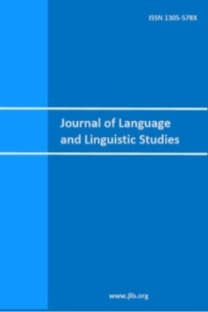Perceptions of secondary school 8th grade students regarding smart board concept
Öz
Technological developments are rapidly becoming widespread especially in developing countries. Educational institutions have also been affected by technological developments. One of the educational technologies which became popular recently is Smart Board (SB). The aim of this study is to determine 8th grade students' mental images of “SB” concept through metaphors. For this purpose, the students studying at 8th grade of a secondary school were asked to complete the sentence of “SB is like…Because…”. Phenomenological research design was used in the axis of qualitative research approach and the data were collected through metaphors in the study. 86 students studying at 8th grade formed the population group of the study. The data of the study were reviewed for content analysis. The metaphors which are not valid were excluded. Then, raw data were formed by transferring these metaphors and their descriptions to computer environment. The metaphors with similar characteristics in these texts were grouped into 5 conceptual categories. According to the research findings, the participants produced 36 valid metaphors. According to the results of study, it was found out that the participants had positive concepts about “SB”. Some participants were found to perceive SB as an unnecessary, boring and constantly deteriorating tool.
Anahtar Kelimeler:
Smart Board; metaphor; student; perception; 8th grade
___
Afacan, Ö. (2010). Fen bilgisi öğretmen adaylarının “fen” ve “fen ve teknoloji öğretmeni” kavramlarına yönelik metafor durumları. e-Journal of New World Sciences Academy, 6 (1), 1242-1254.Aktürk, A.O., Mıhçı, S., Çelik, İ. (2014). Lise öğrencilerinin akıllı tahta kavramına ilişkin metaforları, İnternational Conference On Education in Mathematics, Sciense, 3(2), 120-131.
Altınçelik, B. (2009). İlköğretim düzeyinde öğrenmede kalıcılığı ve motivasyonu sağlaması yönünden akıllı tahtaya ilişkin öğretmen görüşleri, (Yayımlanmamış Yüksek Lisans Tezi). Sakarya Üniversitesi, Sakarya.
Aydın, F., Ünaldı, Ü. E. (2010). The analysis of geography teacher candidates perceptions towards “geography” concept with the help of metaphors. International Online Journal of Educational Sciences, 2 (2), 600-622.
Balkaş, S.R., Barış, M.F. (2015). Etkileşimli akıllı tahta kullanımının öğretmen rollerine, sınıf içi etkileşime ve öğrenci motivasyonuna etkisi. Elektronik Eğitim Bilimleri Dergisi, 4(8), 206-222.
Creswell, J. W. (2007). Qualitative inquiry and research design: Choosing among five approaches (2nd ed).Thousand Oaks, CA:Sage.
Fidan, M. (2018). Evaluation of secondary school students' attitudes towards texts in Turkish textbooks. Erciyes Journal of Education, 2(1), 19-38.
Gün, M. (2015). Ortaokul 8. sınıf öğrencilerinin Türkçe sözlük kavramına ilişkin metaforik algıları. Turkish Studies,10(7), 447-466.
Lakoff, G., Johnson, M. (1980). Metaphors we live by. Chicago: University of Chicago Pres.
Levine, P. (2005). Metaphors and images of class rooms. Kappa Delta Pi Record, 41 (4), 172-175.
Pamuk, S., Çakır, R., Ergun, M., Ayas, C. (2013). Öğretmen ve öğrenci bakış açısıyla tablet PC ve etkileşimli tahta kullanımı: Fatih Projesi değerlendirme. Kuram ve Uygulamada Eğitim Bilimleri, 13(3), 1799-1822.
Patton, M. Q. (2002). Qualitative research and evaluation methods (3nd ed). London: Sage.
Saban, A. (2008). İlköğretim 1. kademe öğretmen ve öğrencilerinin bilgi kavramına ilişkin sahip oldukları zihinsel imgeler. İlköğretim Online, 7 (2), 421-455.
Saban, A. (2009). Öğretmen adaylarının öğrenci kavramına ilişkin sahip oldukları zihinsel imgeler. Türk Eğitim Bilimleri Dergisi, 7(2), 281-326.
Vadebocoeur, J. A. Myriam N. Torres (2003). Constructing and reconstructing teaching roles: A focus on generative metaphors and dichotomies. Discourse : Studies in the Cultural Politics of Education, Carfax Publishing, 24(1), 87-103.
Yalap, H., Yılmaz, A. (2017). Türkçe öğretmenlerinin akıllı tahta kavramına ilişkin metaforik algıları. Millî Kültür Araştırmaları Dergisi, 1(1), 13-24.
Yeşilyurt, E. (2007). Öğretim araç-gereçleri kullanımına etki eden faktörler. E-Journal of New World Sciences Academy, 2(4), 300-312.
Yıldırım, A., Şimşek, H. (2005). Sosyal bilimlerde nitel araştırma yöntemleri, Ankara: Seçkin Yayıncılık.
Yüce, E. (2018). Evaluation of the high school 9th grade English language curriculum of Turkey in relation to the CEFR principles.(Unpublished doctoral dissertation), Hacettepe University, Ankara.
Yüce, E., Mirici, İ. H. (2019). A qualitative inquiry into the application of 9th grade EFL program in terms of the CEFR. Journal of Language and Linguistic Studies, 15(3), 1171-1187.
- ISSN: 1305-578X
- Yayın Aralığı: Yılda 4 Sayı
- Yayıncı: Hacettepe Üniversitesi
Sayıdaki Diğer Makaleler
Using Kahoot as a skill improvement technique in pronunciation
Move analysis of research article abstracts in the field of ELT: A comparative study
The effect of mobile-assisted language learning (MALL) on EFL learners’ collocation learning
Kübra OKUMUŞ DAĞDELER, Mustafa Yavuz KONCA, Hakan DEMİRÖZ
Recep Şahin ARSLAN, Sıdıka IŞIK DOĞAN
Is printed-text the best choice? A mixed-method case study on reading comprehension
Fostering critical thinking skills in ELT through video-based reflection
A rubric study for the evaluation of caricature creation building skills of 6th grade students
